|
|
|
Sort Order |
|
|
|
Items / Page
|
|
|
|
|
|
|
| Srl | Item |
| 1 |
ID:
118927
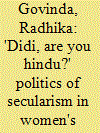

|
|
|
|
|
| Publication |
2013.
|
| Summary/Abstract |
In this paper I take the women's movement as the site for unpacking some of the strains and tensions involved in practical interpretations of secularism in present-day India. Several sources within and outside the movement point out that there has been a tendency to take the existence of secularism for granted, and that the supposedly secular idioms and symbols used for mobilizing women have been drawn from Hindu religio-cultural sources. Women from Dalit and religious minority communities have felt alienated by this. Hindu nationalists have cleverly appropriated these idioms and symbols to mobilize women as foot soldiers to further religious nationalism. Through a case-study of a grassroots women's NGO working in Uttar Pradesh, I seek to explore how women's organizations may be reshaping their agendas and activism to address this issue. Specifically, I will examine how and why the 2002 Gujarat riots affected the NGO, the ways in which it has started working on the issue of communal harmony and engaging with Muslims since the riots, and the challenges with which it has been confronted as a result of its efforts. In doing so, I will show how the complexities of NGO-based women's activism have become intertwined with the politics of secularism.
|
|
|
|
|
|
|
|
|
|
|
|
|
|
|
|
| 2 |
ID:
118920
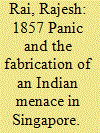

|
|
|
|
|
| Publication |
2013.
|
| Summary/Abstract |
This paper examines how local and transnational developments converged in 1857 to transform European attitudes towards Indian inhabitants in Singapore. Recognized in preceding years as useful to the security and the development of the colony, by late 1857, Indians in Singapore had come to be viewed by Europeans as a 'menace'. That change in disposition was largely the product of factors extraneous to the actions of the local Indian inhabitants themselves. Besieged by news of multiple challenges to the British Empire, European nerves were rattled by perceived threats emanating from sections of the Asian populace in Singapore. In early 1857, a dispute between Tamil-Muslims and Europeans brought to the fore the latter's anxieties and prejudices. That episode was followed, in May, by news of the massive rebellion of native troops in India. The emerging distrust for Indians was exacerbated by public rumours and fanned by editorials and reports published in the local press. Perceptions of immediate danger from the colony of transported convicts, and the fear of an Indian conspiracy during Muharram, sparked a panic that would have ramifications on the position of Indians in Singapore and leave an imprint on the long term political development of the Straits Settlements
|
|
|
|
|
|
|
|
|
|
|
|
|
|
|
|
| 3 |
ID:
118928
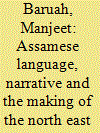

|
|
|
|
|
| Publication |
2013.
|
| Summary/Abstract |
This paper is divided into two broad sections. The first section deals with the Brahmaputra Valley in Assam (north east India) and its transformation into a frontier in the nineteenth century. The section also deals with how this process was closely linked to the re-interpretation of the region's relationship with Indo-Gangetic culture, and the impact on development of the modern 'Assamese' language. The second section interprets modern Assamese novels in the light of the issues raised in the first section. It explores how issues such as indigeneity, the concept of India and modern Assamese language, share a relation of conflict in modern Assamese fiction. It is suggested in the conclusion that, due to such historical specificities, the language and narrative of the frontier require a specific regional approach, and should not be subsumed within larger frameworks such as 'the nation' or 'South Asia'.
|
|
|
|
|
|
|
|
|
|
|
|
|
|
|
|
| 4 |
ID:
118922


|
|
|
|
|
| Publication |
2013.
|
| Summary/Abstract |
Along with the establishment of the Department of Public Health in 1912, the implementation of public health policies became an integral part of city management in Republican Guangzhou. Yet the cholera outbreak of 1932 fully exposed the weaknesses of the medical and sanitary infrastructure of the city. Due to the Guangzhou government's inaction, the Fangbian Hospital, a local charitable hall founded in response to the bubonic plague of the 1890s, involuntarily took over the major responsibility for providing medical services for cholera patients in the early stage of the epidemic. Only after the death of hundreds of patients and Guangzhou being described as a 'world of horror' in the local press did the government-run hospital start to take a more active role. Epidemics have always served as catalysts for change in public health perceptions and practices. This paper attempts to explain how the cholera epidemic of 1932 changed the role of public health in the urban administration of the city. Emphasis is placed on analysing how the people of Guangzhou began to fight for a supply of clean drinking water once they came to realize the link between water and the spread of the fatal cholera epidemic in 1932. Clean water, which used to be seen as a commodity enjoyed by the privileged few, was now increasingly regarded as a citizen's right.
|
|
|
|
|
|
|
|
|
|
|
|
|
|
|
|
| 5 |
ID:
118926


|
|
|
|
|
| Publication |
2013.
|
| Summary/Abstract |
This paper attempts to see how a particular labour market (domestic service), a traditionally male domain, became segregated both by gender and age in the post-partition Indian state of West Bengal, and mainly in its capital city Calcutta. It argues that the downward trend in industrial job opportunities in post independent West Bengal, accompanied by the large scale immigration of men, women and children from bordering East Pakistan (now Bangladesh), led to a general decline in wage rate for those in domestic service. Poor refugee women, in their frantic search for a means of survival, gradually drove out the males of the host population who were engaged in domestic service in urban West Bengal by offering to work for a very low wage and often for no wage at all. As poor males from the neighbouring states of Bihar, Orissa and the United Provinces constituted historically a substantial section of Calcutta domestic workers, it was mainly this group who were replaced by refugee women. The second stage in the changing profile of domestic service since the 1970s in urban West Bengal was arguably set by migrating girl children from different parts of the state to Calcutta city in search of employment. This is probably why West Bengal had the highest girl children's work-participation rate in urban India in 2001.
|
|
|
|
|
|
|
|
|
|
|
|
|
|
|
|
| 6 |
ID:
118919


|
|
|
|
|
| Publication |
2013.
|
| Summary/Abstract |
This paper adds to a relatively new line of research investigating inadvertent transformations of urban colonial space generated by collective trauma. To the now classic iterative, and racial dynamics of Neild's 'accommodation' in the development of Madras,1 and of Yeoh's 'contesting' of the built environment in Singapore2-specifically in the tugging and pulling between local and colonial influences within the spatial discourse of colonial port cities-needs to be added that of single or multiple-event collective trauma. Such trauma, perceived as brought upon by unexpected external causes, might consolidate, perhaps accelerate, or even sever a previous sequence of spatial negotiation, particularly if that sequence was politically vulnerable or immature. The paper is a focused account of such an occurrence: the small-scale yet intensely traumatic events of Hong Kong Island while still in its colonial infancy in 1843, the year of the 'Hongkong Fever'. It argues that a new conception of malaria-considered then a miasma-now linked both to location and construction, led to the first reactive, yet decisive, reconfiguring of a previously improvised urban colonization process, consequently salvaging Hong Kong's position within a wider imperial context
|
|
|
|
|
|
|
|
|
|
|
|
|
|
|
|
| 7 |
ID:
118923
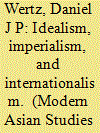

|
|
|
|
|
| Publication |
2013.
|
| Summary/Abstract |
While establishing a framework for colonial governance in the Philippines, American policymakers had to confront the issue of opium smoking, which was especially popular among the Philippine Chinese community. In 1903, the Philippine Commission proposed a return to the Spanish-era policy of controlling the opium trade through tax farming, igniting outrage among American Protestant missionaries in the Philippines and their supporters in the United States. Their actions revived a faltering global anti-opium movement, leading to a series of international agreements and domestic restrictions on opium and other drugs. Focusing mostly on American policy in the Philippines, this paper also examines the international ramifications of a changing drug control regime. It seeks to incorporate the debate over opium policy into broader narratives of imperial ideology, international cooperation, and local responses to colonial rule, demonstrating how a variety of actors shaped the new drug-control regimes both in the Philippines and internationally.
|
|
|
|
|
|
|
|
|
|
|
|
|
|
|
|
| 8 |
ID:
118925
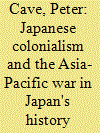

|
|
|
|
|
| Publication |
2013.
|
| Summary/Abstract |
This paper examines changes between 1992 and 2010 in Japanese junior high school history textbooks' representations of imperial Japan's colonialism and aggression in Asia, using documentary study and interviews with actors in the textbook production process. Following a trend to increase textbook material on Japan's wartime aggression in the mid-1990s, after 2000 publishers approached this topic in contrasting ways, some expanding and some reducing their coverage, with dramatically varying results in terms of market share. Publishers' decisions on content were related to their market position and to changes in local textbook adoption procedures that have increased the decision-making power of appointed boards of education at the expense of teachers. Increased market share since 2000 is associated primarily with a progressive pedagogy in tune with recent curriculum reforms. The recent spotlight on textbook adoption has exposed weaknesses in the system, such as inadequate representation of the local community and insufficient guarantee of teachers' expert input in the adoption process. With the introduction of new textbook approval criteria requiring their conformity with the patriotic emphases of the revised Fundamental Law on Education of 2006, the content of future textbooks will clearly be strongly influenced by both approval and adoption processes.
|
|
|
|
|
|
|
|
|
|
|
|
|
|
|
|
| 9 |
ID:
118924


|
|
|
|
|
| Publication |
2013.
|
| Summary/Abstract |
In the latter half of the twentieth century thousands of Khmer people were displaced from their homes along the freshwater rivers of Vietnam's Mekong delta. Their pattern of settlement along freshwater tidal rivers was an ecological adaptation unique in the Khmer-speaking world, of which only vestiges remain. Drawing upon oral histories and ethnographic observations of O Mon, a district in the central Mekong delta, this paper reconstructs a picture of the traditional river-based livelihoods, social structure and religious life of Khmers in this region in the 1940s. It describes how these Khmers were driven from their villages early in the First Indochina War. Experiencing ongoing dislocations in subsequent periods of war and peace, most have been prevented from returning to their former homes or reclaiming their land. Relying on testimony by elderly Khmers, who witnessed the disintegration of their riverside communities, the account challenges existing depictions of the ecology and history of the Mekong delta, offering new insights into the complexity of the Indochina wars and the severity of their consequences.
|
|
|
|
|
|
|
|
|
|
|
|
|
|
|
|
| 10 |
ID:
118921
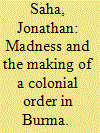

|
|
|
|
|
| Publication |
2013.
|
| Summary/Abstract |
In general, during the nineteenth century the British were indifferent to the condition of the insane in colonial Burma. This was most apparent in the Rangoon lunatic asylum, which was a neglected institution reformed reluctantly and episodically following internal crises of discipline and the occasional public scandal. However, whilst psychiatry was generally neglected, British officials did intervene when and where insanity threatened the colonial order. This occurred in the criminal courts where the presence of suspected lunatics was disruptive to the administration of justice. Insanity was also a problem for the colonial regime within the European community, where erratic behaviour was viewed as a threat to racial prestige. This paper shows how, despite its neglected status in Burma, psychiatric knowledge contributed to British understandings of Burman masculinity and to the maintenance of colonial norms of European behaviour.
|
|
|
|
|
|
|
|
|
|
|
|
|
|
|
|
| 11 |
ID:
118929


|
|
|
|
|
| Publication |
2013.
|
| Summary/Abstract |
This paper critiques current academic usage of the analytic category of 'civil society' in recent studies of contemporary China. The problem is not the lack of good empirical work (which abounds), but rather the way in which understandings of 'civil society' as applied to China have remained insulated from wider theoretical debates emerging from other parts of the world which have queried the productive utility of these understandings. Specifically, recent studies of China continue to define civil society through its alleged autonomy from the state. This definition has led to unsettling discrepancies between theory and empirical knowledge about Chinese society. Moreover, it has caused researchers to pay little attention to the equally complicated question of whether there are sufficient horizontal linkages among various social actors to constitute a civil society in China in the first place. This paper will argue that lessons learned from the rich civil society tradition and scholarship from other parts of the world may be adapted fruitfully to generate more meaningful and nuanced analyses of Chinese associations.
|
|
|
|
|
|
|
|
|
|
|
|
|
|
|
|
|
|
|
|
|